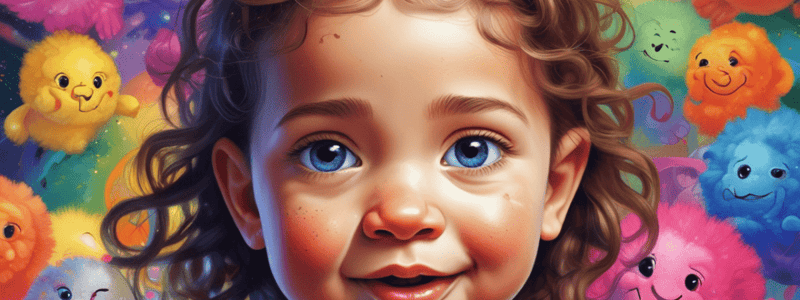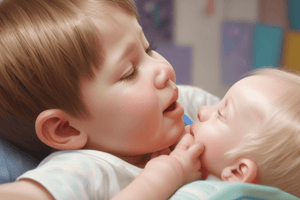Podcast
Questions and Answers
At what age do children typically begin to relate emotions to their causes in the world?
At what age do children typically begin to relate emotions to their causes in the world?
8-12 months
What kind of emotions can children typically label in early childhood (2-5 years)?
What kind of emotions can children typically label in early childhood (2-5 years)?
Simple emotions like happy, sad, fear, surprise, anger
At what age do children typically start recognizing that someone can feel two conflicting emotions at once?
At what age do children typically start recognizing that someone can feel two conflicting emotions at once?
6-10 years
What is emotional contagion and when does it start to be present in very young infants?
What is emotional contagion and when does it start to be present in very young infants?
At what age do children typically begin to understand the difference between external and internal emotions?
At what age do children typically begin to understand the difference between external and internal emotions?
What are display rules in the context of understanding fake emotions?
What are display rules in the context of understanding fake emotions?
What are the three main components of emotions that can be regulated?
What are the three main components of emotions that can be regulated?
What are the three developmental patterns in regulating emotions?
What are the three developmental patterns in regulating emotions?
During which developmental stage do parents usually regulate arousal for infants?
During which developmental stage do parents usually regulate arousal for infants?
What is the primary strategy used by young children to regulate emotions?
What is the primary strategy used by young children to regulate emotions?
What is a common cognitive strategy used by older children to regulate emotions?
What is a common cognitive strategy used by older children to regulate emotions?
How does socialization influence individual differences in emotion regulation?
How does socialization influence individual differences in emotion regulation?
How do parents' reactions to a child's feelings impact the child's emotional development?
How do parents' reactions to a child's feelings impact the child's emotional development?
What role do parents' emotional intensity play in shaping their children's emotional responses?
What role do parents' emotional intensity play in shaping their children's emotional responses?
How does discussing emotions with children help in their emotional development?
How does discussing emotions with children help in their emotional development?
What are the consequences of poor emotion regulation and negative emotionality in children?
What are the consequences of poor emotion regulation and negative emotionality in children?
How does emotional competence in children predict their future adjustment?
How does emotional competence in children predict their future adjustment?
What factors influence the development of children's understanding of emotions?
What factors influence the development of children's understanding of emotions?
What are the stages in Kohlberg's Moral Reasoning Developmental Trends, in order?
What are the stages in Kohlberg's Moral Reasoning Developmental Trends, in order?
At what age is development not complete according to Kohlberg's theories?
At what age is development not complete according to Kohlberg's theories?
What are some criticisms of Kohlberg's stages of moral development?
What are some criticisms of Kohlberg's stages of moral development?
What is the main difference between Kohlberg's and Gilligan's theories of moral development?
What is the main difference between Kohlberg's and Gilligan's theories of moral development?
According to Kohlberg, is moral development complete by the age of 10 years?
According to Kohlberg, is moral development complete by the age of 10 years?
In the Heinz dilemma, was it morally acceptable for Heinz to steal the drug for his dying wife? Why or why not?
In the Heinz dilemma, was it morally acceptable for Heinz to steal the drug for his dying wife? Why or why not?
What is the significance of the Heinz dilemma in Kohlberg's theory of moral development?
What is the significance of the Heinz dilemma in Kohlberg's theory of moral development?
What are the major assumptions underlying Kohlberg's theory of moral development?
What are the major assumptions underlying Kohlberg's theory of moral development?
What is the major concern of Kohlberg's theory of moral development?
What is the major concern of Kohlberg's theory of moral development?
What is the major method used by Kohlberg to study moral development?
What is the major method used by Kohlberg to study moral development?
In which stage of Kohlberg's moral development is the focus on consequences rather than intentions?
In which stage of Kohlberg's moral development is the focus on consequences rather than intentions?
According to Kohlberg, which stage is characterized by the belief that what is right is what satisfies one's needs?
According to Kohlberg, which stage is characterized by the belief that what is right is what satisfies one's needs?
Which stage of Kohlberg's moral development involves winning approval of others by being a good person?
Which stage of Kohlberg's moral development involves winning approval of others by being a good person?
In Kohlberg's moral development, which stage emphasizes the importance of personal duty in maintaining social order?
In Kohlberg's moral development, which stage emphasizes the importance of personal duty in maintaining social order?
Which stage of Kohlberg's moral development views laws as flexible instruments for human purposes?
Which stage of Kohlberg's moral development views laws as flexible instruments for human purposes?
Study Notes
- Children go through developmental stages in identifying, understanding, and regulating emotions, starting from infancy to middle childhood.
- Emotional contagion is present in infants, showing an awareness but not necessarily understanding of emotions.
- Children gradually learn to identify emotional expressions, connect them to facial expressions and tone of voice, and relate them to causes in the world for social referencing.
- As children grow, they progress in identifying emotions from simple (happy, sad) to more complex (pride, shame, guilt) emotions.
- Children also learn to understand the causes of different emotions at different ages, starting with happiness and progressing to more complex emotions like shame, guilt, and jealousy.
- Children start learning about fake emotions around 3 years old, attempting to disguise negative emotions and understanding the difference between external and internal emotions.
- Regulating emotions involves caregiver-to-self and behavioral-to-cognitive developmental patterns, where children learn to initiate, inhibit, or modulate various components of emotions.
- Individual differences in emotion regulation are influenced by factors such as temperament, socialization, and models of emotion and regulation taught by parents.
Studying That Suits You
Use AI to generate personalized quizzes and flashcards to suit your learning preferences.
Related Documents
Description
This quiz explores the three components of emotional development in infants: identifying emotions, understanding causes of emotions, and distinguishing between real and false emotions. Topics covered include emotional contagion in young infants, recognizing emotional expressions, and relating emotions to their causes.




